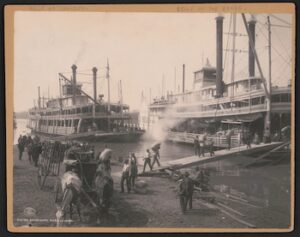
Mississippians boarding ships
*On this date in 1837, we celebrate the Mississippi-in-Africa. This colony on the Pepper Coast (West Africa) was founded by America's Mississippi Colonization Society and settled by American freedmen and former slaves.
The American Colonization Society (ACS) was founded in the United States in 1816 as a joint project by proslavery and antislavery advocates to establish a colony for free American blacks in West Africa. Slaveholders wanted to relocate free people of color out of the South, as they believed that free blacks threatened the stability of their slave societies. Some who supported the eventual abolition of slavery thought that transporting freed slaves to Africa would give them a better opportunity to make their communities. Disheartened by the discrimination faced by free blacks in the North, some abolitionists also supported the ACS because they thought free Blacks might be able to create a better society for themselves in Africa.
Most free Blacks did not want to emigrate; they believed they had a native-born claim to the United States, were part of the society, and wanted equal rights in their native land. Samuel Cornish and John Brown Russwurm published Freedom's Journal in New York City, writing articles that opposed the colonization movement. In June 1831, planters and slaveholders co-founded the Mississippi Colonization Society, affiliated with ACS. Their goal was to remove free people of color and freed slaves from their state to the developing colony of Liberia on the African continent. This society bought a portion of land for the colony, which was known as Mississippi-in-Africa. They believed that free blacks threatened the stability of American slave societies, and Mississippi's slave population outnumbered whites by a three-to-one ratio.
The first settlers arrived in 1837. The colonists built the town of Greenville in about 1838. Josiah Finley, the brother of ACS founder Robert Finley, was governor of Mississippi in Africa from June 1837 to September 10, 1838, when local fishermen murdered him. Isaac Ross provided for the manumission of his slaves in his will if they agreed to relocate to West Africa. In the late 1840s, approximately 300 freedmen from Ross's Prospect Hill Plantation emigrated to Mississippi in Africa. They were the largest single group to migrate to Liberia. The freedmen developed society in West Africa as they had left but took the dominant position about indigenous natives. They built houses in the style of Southern mansions and established a hierarchical society with strong continuities to what they had known in the United States. They established plantations and battled local tribes for control of the territory, believing their American culture and Christianity made them superior.
This settlement existed independently from 1835 until 1842 when it was incorporated into the Commonwealth of Liberia. In 1847, Liberia became independent of the American Colonization Society. Journalist Alan Huffman's history of the settlement explores its influence in contributing to more than a century of resentment between most tribal peoples and the Americo-Liberians, descendants of the colonists who dominated the politics and economy of Liberia well into the 20th century. These groups have been on opposite sides of the civil war in Liberia since the 1980s.